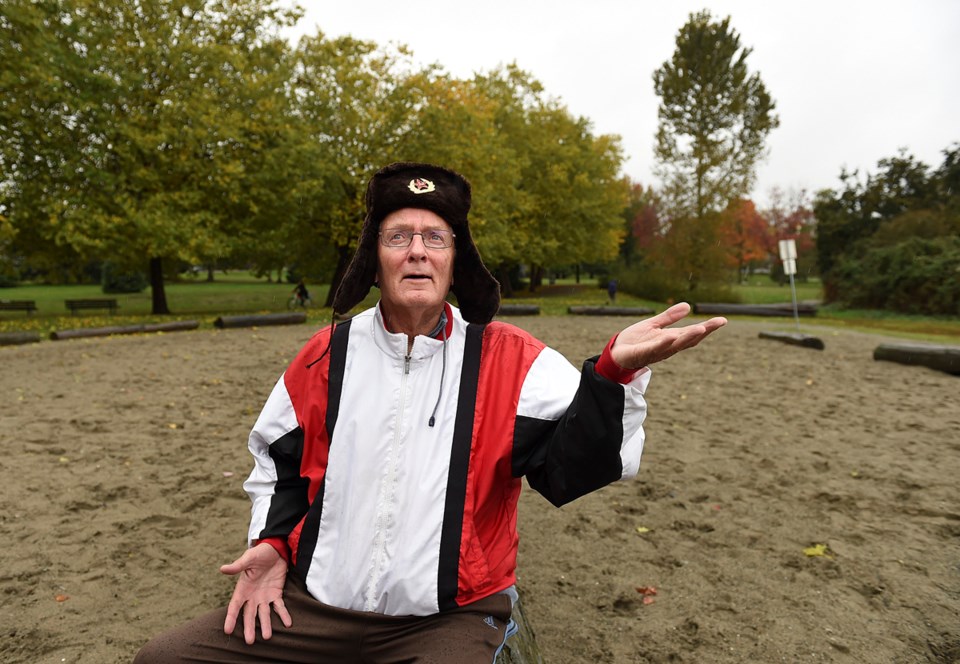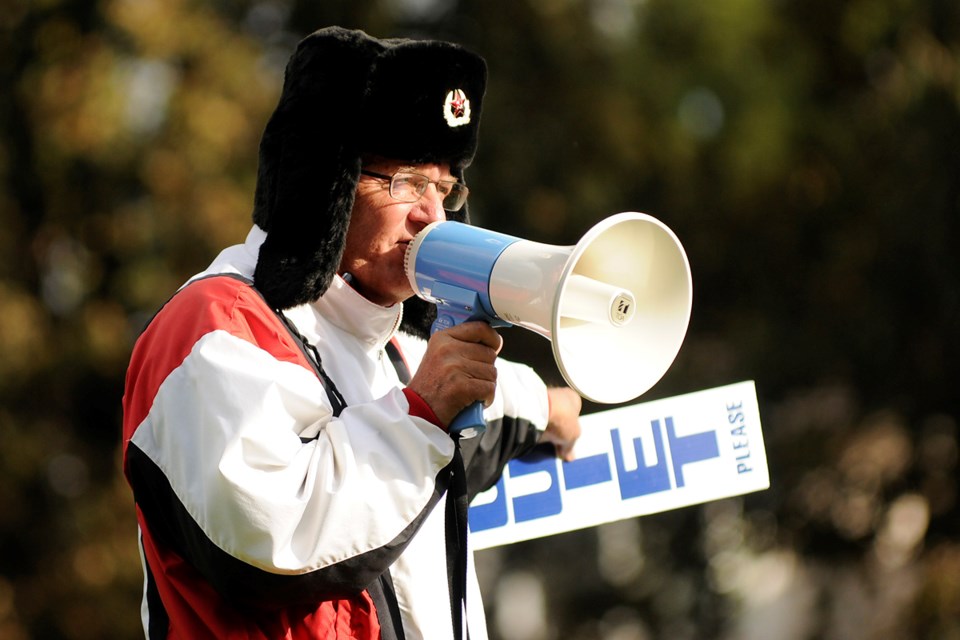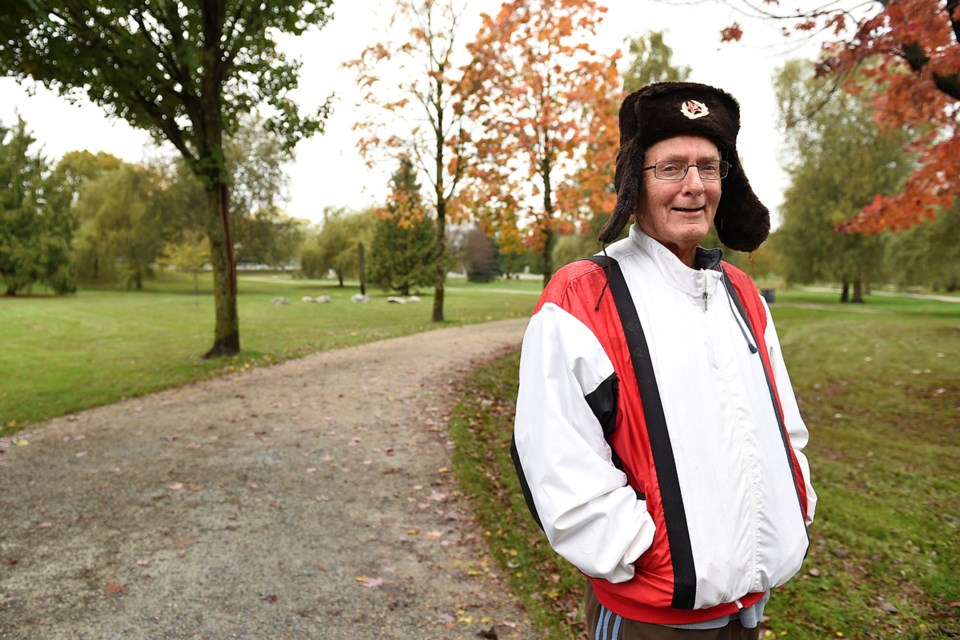Ken Elmer has been at a lot of start lines. He’s been on both side of the twitchy instruction, “Runners take your mark,” and tomorrow, the 68-year-old will yield a megaphone at a cross-country meet he helped create and herd thousands of children in oversized pinnies to the starting line of the at Trout Lake.
For the last decade, Elmer has volunteered at the often-raucous meet that , “K through Grade 7,” from dozens of Â鶹´«Ă˝Ół»public schools to the large East Side park. He’s a calm in the centre of the most adorable, pint-sized, never-run-a-lap storm of children, but before organizing that chaos, the elite international competitor was on the other side of the start line.
Raised in Vancouver, as a UBC Thunderbird middle-distance track athlete, Elmer was one of the few runners on the planet to crack a four-minute mile. In 1973, under the benchmark. In 1972, the Olympian raced in the 1500m at the Munich Games. Three years later, he finished fifth in the 800m at the 1975 Pan American Games in Mexico City. Incredibly, before he dedicated himself to running, Elmer also had two caps with the national junior soccer team, competing for Canada against Italy and the Soviet Union.
“By that time either one – soccer or track and field – was full time. I loved soccer but I picked running because I could count on myself. If I did well, I got the credit. If I did lousy, I got the credit,” he said.
Soon after, he began organizing meets for local racers to enter. One was none other than the Sun Run, the event that became Canada’s largest 10km run, which he helped create along with Doug Clement, Diane Clement, Jack Taunton and others. He was under the Granville Bridge at the start line for the inaugural race in 1985 before the route was changed the following spring. He was the Sun Run’s volunteer race director for 15 years.
“I had all my friends helping before it got too corporate,” he said. “What we were trying to do was feature our own elite athletes and put them on a pedestal here in B.C. and Canada.”Ěý
Ěý

As a P.E. teacher, Elmer had a lot of practice corralling elementary school children, from the Velcro-dependent kindergarteners to their more serious older teammates. He started a 100-mile run club at McKechnie elementary and also had students running hills on a quiet road next to the Point Grey golf course.
“We had 60 kids running near Marine Drive at eight in the morning. I’d say it was the only one of its kind in the country,” said Elmer, who typically jogged with the students who were awarded a t-shirt for reaching the century mark.
The district held a city championship at Little Mountain in the mid-’80s and soon outgrew the course through Queen Elizabeth Park. In 1990, the meet as moved to Trout Lake where it’s still held put on by co-directors and teachers Shane Bilodeau and Gillian Wilson-Haffenden as well as district athletic co-ordinator Harp Sohi.
“We had 180 kids who would go on runs, and I put on track meets at the school all the time,” said Elmer.
How does he and a handful of volunteers at the annual meet keep thousands of tiny and pre-teen runners organized? They have them teach each other.
“We start with the Grade 7s first so everybody else that is around can see how it is done because they have been doing for a while and they are easier to manage,” said Elmer. “With the younger ones, you have to go slower. I’m firm and clear. We’ve had the kindergarteners take off before the siren, so you have to haul them back and start again.”
As one group of racers waits for their race, a second group gathers and waits 30 metres back.
“When all the Grade 1 girls, for example, are on the start line, the boys are waiting and when it’s their turn, they come up and have heard a little bit of what I’ve said. I wait until they are motionless, they wave to their friends, and then off the go with the siren.
“They are having fun and fitness is good for them. A school’s runners K through 7, they are all on one team, and that’s what I like about it. The Grade 6s really help and cheer for the Grade 2s at their school. You can really develop a cool school spirit because kids are all trying to do the best they can for their school.
This video from 2014 identifies Ken Elmer as the volunteer race director. Just listen how he speaks to the young runners.
For the most part, Elmer said children and teenagers “absolutely do not” get enough exercise today. “Almost every school in the ’80s and ’90s had a specialist physical education teacher. I had all the kids three times a week, so we could do some pretty hard running each period and then go on to skills in volleyball or basketball or whatever it was.
“One thing that makes it a little more difficult now is every teacher has to do it on their own. Since they’re not all specialists, it is harder to get a high quality physical education program in school. It’s the same with music,” he said.
While he was still an undergraduate student at UBC, Elmer was selected by the Canadian Olympic team at the Summer Games. In Germany on Sept. 4 nearly a week before he raced at Munich 1972, he and dozens more teammates were at the CBC media centre to watch the hockey series against the U.S.S.R. that gripped the nation back home.
He didn’t return to the athletes’ village until the middle of the night at which point, Elmer and a handful of track athletes scaled a chain-link fence instead of taking the long way to the front entrance. There wasn’t more security than that, he said.
“You could lift the fence up. It was as Mickey Mouse as you can make it.”
Elmer was startled awake by what he thought was the sound of garbage bins being knocked over outside the dormitories where the Canadians were housed. Next to their building, the Israeli team was housed. Elmer didn’t witness the masked Palestinian gunmen or the Israeli hostages.
“They came in right into the dorm right next to where we were staying,” he said. “The next day, of course, the village was under siege.”
Eleven Israeli athletes and one German police officer were killed that day.
Four decades later, several Canadian water polo players revealed it may have been them who, upon returning after the hockey game, Elmer scaled. The next day, Germany security guards were positioned along the perimeter and the Olympic Games have never operated the same.
“That was the beginning of more secure events. Now you can’t get into any of the Olympic venues or the village without proper accreditation and metal detection,” said Elmer, who has worked as a driver for NBC at Â鶹´«Ă˝Ół»2010 and Sochi 2014.
The 26th annual Â鶹´«Ă˝Ół»elementary school cross-country meet begins at 1 p.m. Oct. 20 at Trout Lake. The first race is the Grade 7 girls, followed by the Grade 7 boys and going down in age until the kindergarteners get their chance.
Ken Elmer will be at the start line.




